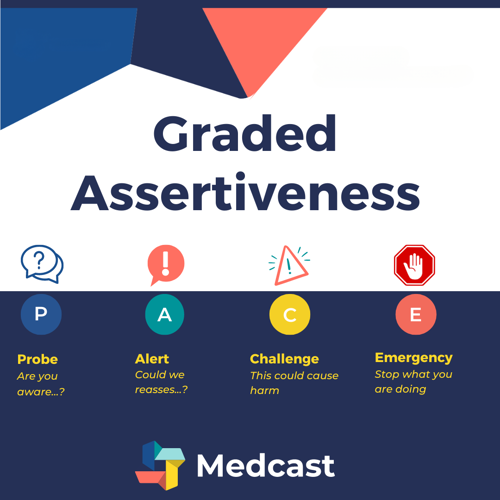How Graded Assertiveness Can Improve Patient Safety and Team Dynamics
Sarah is commencing her medication round and notices that the Endone prescribed for one of her patients is a much higher dose than she thinks is reasonable. She recalls that the patient experienced respiratory depression at the lower dose and required a dose of Naloxone. She is unsure about approaching the RMO about the prescription as they have been very busy and were short with her on their last encounter.
Sarah decides to employ graded assertiveness to address the issue using the PACE mnemonic;
Probe:
Sarah: "Doctor, I'd like to discuss the prescription for high-dose Endone for Mrs. Johnson. Can you explain the rationale behind this decision?"
The nurse probes the doctor to gain a better understanding of the reasoning behind the medication prescription, seeking clarification before expressing any concerns.
Alert:
Sarah: "Doctor, I'm concerned about the potential risks associated with the high dose of Endone for Mrs. Johnson, particularly considering her history of respiratory depression with the last dose requiring Naloxone."
The nurse alerts the doctor to their concern regarding the medication's potential risks, emphasising the need for further consideration and evaluation.
Challenge:
Sarah: "If I administer this dose of Endone to Mrs. Johnson I am concerned she will have respiratory depression as she did with the previous dose of only 5mg. Given Mrs. Johnson's history, I wonder if there might be alternative pain management strategies we could explore. Would you be open to discussing other options?"
The nurse challenges the doctor's prescription by suggesting alternative pain management strategies, advocating for a safer approach tailored to the patient's specific needs and medical history.
Emergency:
Sarah: "I am not prepared to administer this high dose of Endone to this patient in this environment due to the high risk of respiratory depression. If Mrs. Johnson needs this level of opioid for pain relief her care will need to be escalated to a higher acuity.
Graded assertiveness supports open discussion and team work, mitigating language is avoided. In this scenario, the nurse employs the ‘right to refuse’ for medication administration as a last effort to speak up for safety and offers an alternative safer location for the patient if this is the approach that the Doctor still considers the best one for the patient.
In this example, graded assertiveness empowers effective communication of concerns, advocacy for patient safety, and navigating hierarchical dynamics within the healthcare team. By incrementally adjusting the assertiveness of the communication based on the urgency and response of the recipient, healthcare professionals can foster a culture of open dialogue, collaboration, and accountability.
However, it's essential to recognise that graded assertiveness should always be accompanied by active listening, mutual respect, and a commitment to patient-centred care. Healthcare organisations can further support the use of graded assertiveness by providing communication training, fostering a culture of psychological safety, and encouraging interdisciplinary collaboration.
Graded assertiveness serves as a vital communication tool in healthcare, enabling healthcare professionals to effectively address concerns, advocate for patients, and promote a culture of safety and excellence. By mastering the art of graded assertiveness, healthcare teams can enhance communication, mitigate errors, and ultimately improve patient outcomes in the challenging and dynamic environment of healthcare delivery.
Related courses
- Critical Bytes - The role of crisis resource management
- The PREPARED Course - Preventing & Responding to Clinical Deterioration
- PACED: Paediatric Assessment of Clinical Emergencies & Deterioration
- Advanced Life Support (ALS) 2 Day Face-To-Face
- Paediatric Advanced Life Support (PALS) 2 Day Face-To-Face
- The ALERT™ Course

Grace Larson, RN, BN, CertIV(TAE), GradDipClinNurs(PaedCritCare), MAdNursPrac(PaedCritCare), has extensive experience in paediatric nursing, with 13 years in Paediatric Intensive Care Units (PICU). She’s published journal articles in the specialty area of pain and sedation in PICU, and has presented at national and international conferences on the area of pain and sedation in paediatrics. Grace has previously worked with the ACCCN delivering Paediatric Advanced Life Support in Victoria, bringing a wealth of experience into her clinical teaching on paediatric resuscitation. She has also consulted with NSW Health on quality and safety delivering within PICU, and has been contracted with the ANMF to develop nursing programs for nurses who require additional education as part of their practice requirements.
Become a member and get unlimited access to 100s of hours of premium education.
Learn moreStories about topical steroid withdrawal are difficult to put into context for both consumers and health professionals. The outcome is that many consumers are avoiding using topical corticosteroids, which in many cases, makes it harder to manage conditions such as eczema.
You are working in ED and have received a call from Pathology regarding blood results that you took earlier on Lauren, who is 18 years old and 30 weeks pregnant with her first child. Discover the diagnosis behind Lauren's abnormal blood results and learn the symptoms, risks, and management of this life-threatening obstetric emergency.
Jaime has suffered from severe eczema for most of his life. This podcast delves into the interactions that take place between consumers and health professionals in the eczema journey.



